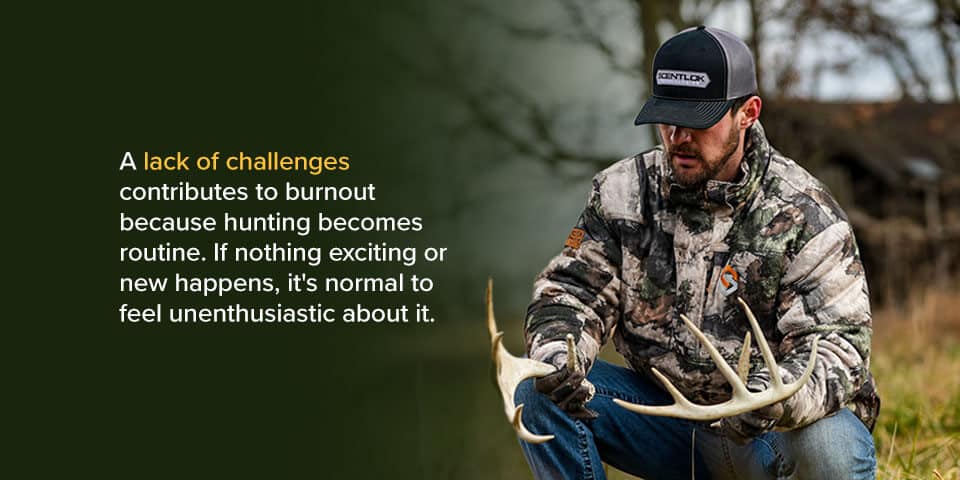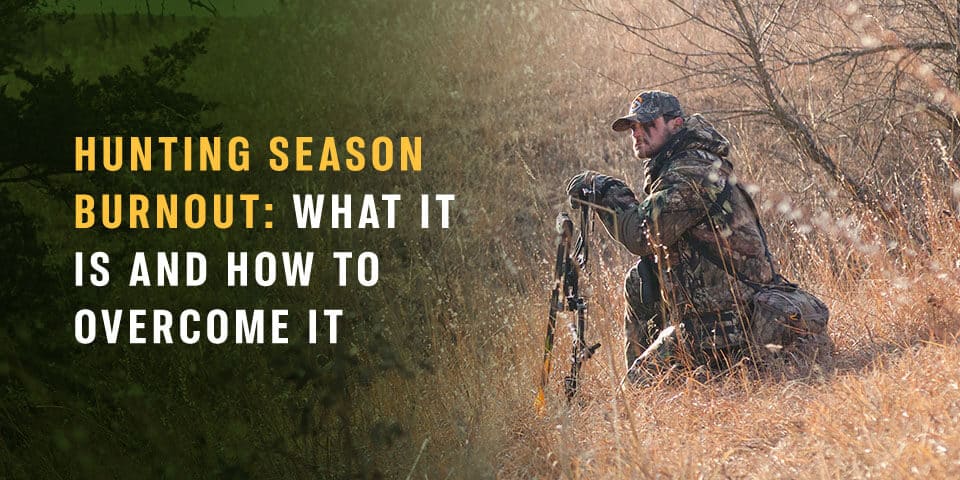Hunting Season Burnout: What It Is and How to Overcome It
At some point, hunting season will end. It’s normal if that end brings you relief — the end of hunting season allows you a chance to recharge for the next one. If you find that you aren’t looking forward to next hunt with excitement, you may be suffering from hunting season burnout.
Hunting season burnout is like any other type of burnout, but it stems from hunting. It can be hard to go from feeling excited to indifferent regarding your favorite sport. Understanding more about hunting season burnout is the best way to overcome it.
What Is Hunting Season Burnout?
There are many different ways to define burnout. It’s exhaustion, usually mental and physical, resulting from prolonged stress or frustration. It can lead to negative feelings toward a particular activity or a loss of motivation. People typically experience burnout from work, but it’s also common during hunting season when the early mornings and long days begin to catch up with you.
At some point in your life, you’ll likely experience burnout. Continuously doing the same activity without seeing the trophy your after impacts your eagerness and excitement for that activity, especially when waking up well before daylight and venturing out into the cold. For instance, playing a sport for a season is fresh and exciting. But it will quickly become exhausting because of all the training and games. By the time the season is over, you’ll probably be happy to take a break. If you play the same sport for many of the following years, it will seem repetitive because it’s no longer new.
Burnout Symptoms
While burnout affects everyone differently, there are some common symptoms. Hunting season burnout symptoms can include:
- Mental and physical exhaustion: This can involve having a low energy level, being fatigued or experiencing physiological symptoms, like stomach aches or headaches.
- Detachment or withdrawal from hunting: If you’re experiencing withdrawal or detachment, you could dread going hunting, feel numb and detached from it, experience difficulty concentrating or have a hard time hunting.
- Negative feelings, irritability or cynicism: These feelings can show up as impatience, irritability toward family, friends or coworkers or feeling cynical or negative about hunting or questioning the point of it.
Sometimes, what you love doing will no longer appeal to you as you age. Most people with hunting burnout are tired of the routine of it, bored of not seeing deer or their target buck. But don’t worry — these symptoms aren’t forever. Understanding what’s causing your burnout can help you eventually overcome it.
Causes of Hunting Burnout
Hunting season burnout causes differ for everyone. Sometimes, it happens when hunters skip one of the developmental stages. The five developmental stages for hunters are:
- The shooter stage: In this stage, the hunter is trigger-happy. They would rather get any shot than wait patiently for a good one. Being too eager to shoot can lead to taking bad shots. Mentoring and target practice helps most hunters move out of this stage.
- The limiting-out stage: Hunters in this stage measure their success by the number of animals they’ve killed. Sometimes, the need to reach a kill limit causes hunters to risk unsafe shots. People grow out of this stage by spending time with mature hunters.
- The trophy stage: During this stage, the hunter measures success based on the size and maturity of the animal, not the number of animals. Generally, they focus on bigger game. They ignore anything that doesn’t measure up.
- The method stage: Hunting becomes about the method in this stage. Hunters might have a weapon of choice. It can be the same for all animals or differ depending on the type of animal. The goal of this stage is to hone your skills through research and experience. Limiting out may still play a role, but how you accomplish it is more important.
- The sportsman stage: This last stage of development for a hunter indicates maturity. The hunter becomes less concerned about the harvest and enjoys the hunt. They appreciate the outdoors, the process of the hunt, the companionship of other hunters and the prey.
Many hunters look down on the first two stages. They might skip these stages in favor of the trophy stage. This can cause burnout because bagging mature game takes skill and knowledge. The only way you can gain both is through experience. Hunting mature animals also means the hunter is sitting and watching a lot of other game animals without taking a shot.
Another cause of burnout is a lack of challenges or opportunities. Often, there isn’t a lot of land with public access around your home. If you can’t find any, you must buy land, seek permission or leasing opportunities or find public land elsewhere to hunt on. All of this can be more challenging than the act of hunting and take the fun out of it before you begin.

A lack of challenges contributes to burnout because hunting becomes routine. If nothing exciting or new happens, it’s normal to feel unenthusiastic about it.
Burnout can also be caused by allowing hunting to define you. Instead of it being a passion or a hobby, it consumes you. When that happens, you can eventually become tired of it.
Hunting, in general, is tiring. You spend hours scouting, planning and hanging treestands or planting food plots. You could spend days or weeks hunting a deer only to be unsuccessful in the kill. At some point, it may become too much, and you will feel the urge to do something else or not go hunting.
How to Overcome Hunting Season Burnout
Hunting season burnout is real for some people. You can take a break for a weekend, few weeks or even a season and recharge. You can also try doing some different types of hunting or hunt with friends more often to make it fun again.
You can also try to overcome burnout by taking a trip to a neighboring state or hunting in a new location on public land. A new hunting location will build excitement about scouting the land and learning how to hunt on it. A change in scenery can go a long way in changing your mood.
Before hunting season even begins, you can prevent burnout by setting realistic trophy goals. Do your research and think about what you’ve shot in your hunting area. That’ll manage your expectations and avoid any potential disappointment if you don’t shoot what you were hoping to, which could contribute to burnout. Also, if you have been waiting on a trophy and haven’t had any luck, then harvest a doe for meat or to share with family and friends.
Check out Moultrie Mobile Cellular Trail Cameras
You can bring the excitement back into your hunt with Moultrie Mobile’s cellular trail cameras. Our cellular trail cameras are suited to any hunting or security need. They can help you scout the land and identify the spots with the most activity. You’ll know what hours the wildlife in the area is most active. This can save you from sitting in a stand from sun-up to sundown. It will also bring excitement back into the hunt because you’ll have a better chance of spotting something. Plus, nothing keeps you motivated like knowing a big buck was recently in the area.
Browse our selection of trail cameras to bring the excitement back into hunting.


Featured
Juicy homemade jalapeno cheddar brats are perfect for grilling all summer long. They’re packed with all the right seasonings and fresh ingredients, making them extra tasty.

Featured
MeatEater and Moultrie Mobile join teams to bring hunters closer to nature.

Featured
These wild turkey skewers are tender and smothered in a homemade teriyaki glaze. Wild turkey sometimes gets a bad reputation for being a tough meat but when prepared properly using the steps in this recipe, the results are amazing.




